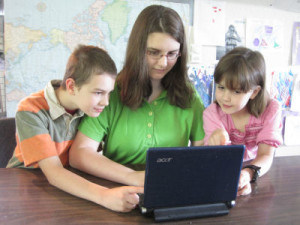Why Homeschool?
For me, a public school teacher for the past ten years who homeschools all seven of my own children, the answer to the question “Why homeschool?” is so obvious that it hardly justifies inquiry. However, for those who are contemplating this question, I will attempt to defend homeschooling with a few facts:
- Homeschoolers perform better academically than students in public and private schools.
My own children, all of whom are homeschooled, outperform the national average on every standardized test they take. When they compete academically, as they do at the Junior Classical League convention every year, they outperform all of their public school peers as well as their peers from prestigious, and very expensive (>$15,000/year), private schools like Lakeside Upper and Middle school in Seattle.
In general, homeschoolers run academic circles around their social peers. Although a small portion of the general population, they always place in the finals of our national spelling bees. 74.2% of homeschooled students take some form of college class before age 24 as opposed to only 46.2% of the general population (Ray 1).
- Homeschoolers are more social than their peers.
Many parents have the bizarre conception that putting 30 hormonal teenagers in the same class is the definition of proper “socialization.” Many of these same parents think that homeschooled kids are “weird” or socially “imbalanced.” However, the culture created by an immature peer group, including its language and dress, is the real deviation from the norm. All of my students have to dress and act alike or face ostracism from their peer group. Even the rebels look alike. How is this “normal socialization”? For the sake of discipline, classes at school must restrict talking, interacting, and socializing; at home these are a natural part of the educational experience (Sauer 2). Which of these is more natural? When students are finally released from this highly unnatural and age-segregated system, often when they enter college or the workplace, they find that it is OK to be different. For the first time they can act naturally.
Speaking from my own experience, my children are able to interact very naturally with my public-school students when they take part in Latin Club at my school. My students generally make comments about how smart my kids are, but they do not find them to be “weird” or unsocial.
- Homeschoolers are more likely to accept and internalize their parents’ beliefs.
The religion of the public schools is secular humanism. The absence of the divine in the curriculum teaches that God is irrelevant to most forms of academic inquiry. Those of us in the church know that there is a major problem with teenagers abandoning the faith of their parents. Many books have been written on this subject. Brian Ray’s research in the book Home Educated and Now Adults revealed that as adults 94% of home schooled students strongly agreed with the statement, “My religious beliefs are basically the same as those of my parents” (www.nheri.org).
- Many mainstream educators support homeschooling.
I am a public school teacher, and I do a good job with the students and resources that I am given in the public system and I will continue to do my best with the students who are sent my way. However, I firmly believe that all students would be better educated in the home, using resources and experts, like myself, as needed. Educators like John Holt and Ed Nagel agree (Sauer 1).
- Parents learn more when teaching their own children.
In the typical schooling scenario, the parents send their children to “professionals” to do the job of educating their kids. By this method, students quickly learn to look to others for answers to their questions, and parents begin to believe that others can educate their children better than they themselves. In other words, students begin to view their parents as academic incompetents, and parents begin to believe this themselves.
When parents take the responsibility of educating their kids personally, the nature of the home changes from an entertainment zone to an education zone. Games, TV, music, and movies all must give way to more important and pressing concerns. Parents become librarians, mathematicians, scientists, writers, readers, pastors, curators, and coaches. They are no longer seen as incompetent and irrelevant by their children. When they see a weakness in themselves, they correct it or find an expert to meet that specific need for their child.
- Homeschoolers are better missionaries.
School-age students are terrible missionaries. When I was a public-school student, I faithfully attended youth group and memorized passages from the Bible. I refused to go on a Spring Break trip to Florida with my friends because I did not want to “walk in the counsel of the ungodly.” However, my personal righteousness did not win any of my friends to Christ.
In my own classes, the largest group of public-school missionaries is the Mormons. However, these students are far more influenced by their peers than their peers by them. In other words, with Mormons in my class the levels of caffeine and vulgarity remain the same, while the clothing and attitudes of the religious students are indistinguishable from the others. Students should be missionaries, but the age-segregated, secular school system evangelizes far more effectively than our kids ever could.
Homeschooled students are more civically involved than their peers (Ray 3). They believe that they can affect and change the society more than others of their age. They are better equipped to share their faith with a Biblical worldview than those who are educated in the public and private institutional schools.
- Parents are the best teachers.
Parents send their students to me because I am an “expert.” I have had years of training in my disciplines of English and Latin. I have studied adolescent behavior and psychology. I spent a year as an apprentice to a master-teacher before getting my own classroom. I have a B.A., an M.A., and I’m working on a PhD. How can the typical parent compete with that?
I’ll tell you how. I am expected to educate 150 students in a typical school day. The typical parent needs to educate fewer than a dozen. In my classes, students must compete for my attention and the attention of their peers, adopting the language, manners, and mores of their peers in the process. At home, they have the attention of mom or dad and they do not need to compete. I have students in every class who are behaviorally and mentally “disabled.” At home, no student has a label and every student can get special attention. In my school, the highest form of discipline is suspension, a consequence that no student fears. At home, parents have a wide variety of disciplinary tools, all of which their children fear. Teaching 150 students in a day, it is difficult for me to ensure that every student, from the mentally delayed to the academically gifted, gets what he or she needs. At home, every child can get just what he or she needs. Even in the lower grades, when teachers have fewer than 30 in a class, the sheer numbers and discipline problems make teaching the most critical and fundamental skills of reading and writing, skills that are best taught one-on-one, nearly impossible to teach well. For example, my wife has been working with my 5 year-old son on reading lessons. At lesson 40, he was very frustrated, nearly to the point of tears. My wife brought him back all the way to lesson 20, and he enjoyed reading again and within a few weeks made it back to lesson 40. In a regular classroom, the lessons would have kept piling on, little Christian would have become more and more frustrated, and he may have viewed himself as a poor reader, just because he couldn’t go back 20 lessons when he needed to.
In short, the home environment and the loving guidance of a parent supersede all of my degrees, expertise, and genius. The competition is not even close. The home is FAR superior to anything that I can do in my classroom, no matter how well-trained and hard-working I am. If a parent can read, write, and do math at the high-school level, or can learn to do these alongside their child, then they will do a better job educating their child than any professional educator ever could. In fact, parents could know far less and do a better job. A study of tribal mothers in Uganda conducted by Dr. Marcelle Geber showed that illiterate moms were raising children who were more “intellectually and socially alert” than their educated peers simply because they remained close to their children while those of the upper-class sent their children to experts (Moore 2).
In short, homeschooled students are more likely to be smart, spiritual, and successful than their public and private school counterparts. Isn’t that what you, as a parent, want for your own children?
Works Cited
Moore, Dr. Raymond and Dorothy. Home Grown Kids: A Practical Handbook for Teaching Your Children at Home. The Moore Foundation, 1984
Ray, Brian D. “Home Educated and Now Adults: Their Community and Civic Involvement, Views About Homeschooling, and Other Traits.” National Home Education Research Institute. June 2004. www.nheri.org
Sauer, James Leslie. “The New Little One-Room School.” Eternity: April 1986.

